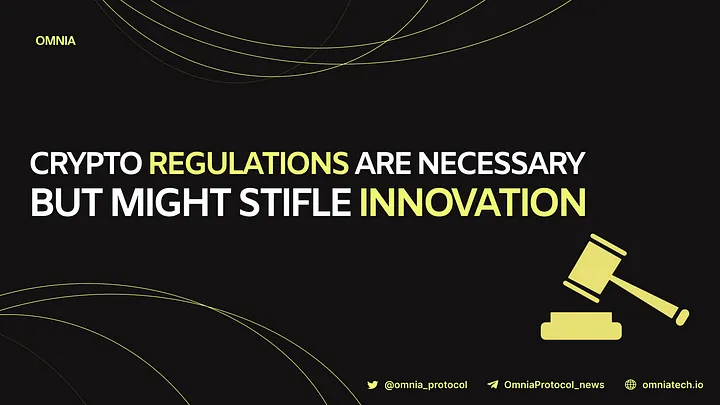
Crypto Regulations are Necessary But Might Stifle Innovation
The emergence of smart contracts spearheaded by Ethereum kicked off a new era of blockchain technology which opened the eyes of developers and innovators who sought to create a whole new future of finance on the web. Such self-executing code opened the doors to transferring traditional financial instruments and services onto the blockchain, thus giving rise to Decentralized Finance (DeFi).
As DeFi was kicking off, the same developers and innovators found more use-cases of blockchain technology resulting in the emergence of Non-fungible tokens, ICOs, IDOs, IEOs, the Metaverse, and much more.
Crypto-Related Events in 2022 Have Exposed Risks Faced by Retail Investors.
From as far back as the ICO boom of 2017 to 2018, regulators such as the SEC and the European Securities and Markets Authority (ESMA) have been issuing warnings about the risks such investment opportunities pose to the regular retail investor. The two agencies have gone on to classify token sales as securities and have been slowly clamping down on such activities within their jurisdictions.
However, calls for regulating the industry have not been as ‘loud’ over the years. But several crypto-related events in 2022 have massively exposed the industry’s underbelly, thus jumpstarting an accelerated need for legislators and regulators to bring some much-needed order into the industry.
Firstly, hackers such as the Lazarus group responsible for the Axie Infinity attack have opened new questions about how to enforce existing sanctions, such as those facing North Korea, on the blockchain. Similarly, Russia’s invasion of Ukraine has resulted in a similar query regarding enforcing ongoing global sanctions on various platforms such as crypto exchanges.
Secondly, the UST depegging event jolted the US treasury, the Bank of England, and the European Central Bank into recommending the drafting of legislation to regulate stablecoins and protect retail investors from future bank runs.
Thirdly, the case of an OpenSea employee being arrested and charged with insider trading of NFTs has highlighted the need to monitor the industry and protect investors from such activities.
Fourthly, the ongoing insolvency of the crypto lending platform of Celsius has brought to light the need for retail investor protections in situations where DeFi protocols face challenges due to a crypto bear market such as the one being witnessed right now.
Crypto Regulation is Necessary.
As demonstrated above, major crypto-related events of 2022 have intensified discussions and activities surrounding the regulation of the industry.
There is an urgent need for retail investors to be protected against similar events in the future and the following practices that are illegal in traditional finance but have now found their way into the crypto-verse.
- Market manipulation, including pump and dump schemes.
- Insider trading.
- Frontrunning.
- Frauds and scams.
- Money laundering.
- Hacks.
- Rugpulls.
- Misleading advertising of projects.
- Massive crypto market downturns. (Traditional stock markets have circuit breakers that halt trading when there is a significant market selloff.)
Strict Crypto Regulation Could Stifle Innovation.
However, well-intending legislators and regulators could push their role of protecting retail investors to the point where it hurts the crypto industry.
For example, in a recent analysis of the proposed EU legislation on Non-custodial wallets, the team at OMNIA highlighted the drawbacks of such an enthusiastic approach toward bringing order to the industry.
Passing the proposal as-is will force crypto users in the EU to use only compliant crypto wallets when transacting within the region. Crypto services providers will also be tasked with the arduous task of collecting, storing, and maintaining users’ personal information to stay compliant with the EU guidelines. As a result, crypto companies that will not manage to set up such infrastructure will be forced to migrate to friendlier jurisdictions or close down their businesses entirely.
Additionally, implementing KYC and AML procedures in the EU might create massive personal data honeypots that could be used to carry out Web3-focused attacks such as phishing, hacking and direct extortion in the form of kidnappings.
The risks of heavy-handed regulation can even go further, thus causing additional harm to the industry as demonstrated below:
- Arrests and charges targeting crypto exchange founders such as Bitmex’s Arthur Hayes could scare away would-be entrepreneurs from venturing into similar crypto businesses.
- Similar arrests, charges, and fines targeting blockchain developers could scare potential builders of decentralized applications from taking action on their ideas to improve the industry’s various facets, such as DeFi, NFTs, crowdfunding, gaming, and the Metaverse.
- Strict regulation in select countries and regions such as the US and EU would translate to the migration of talent and crypto users to crypto-friendly jurisdictions such as El Salvador, Bahamas, and the UAE. Consequently, the proverbial brain drain will be an unintended consequence of such regulation.
- A similar migration will occur due to banning Proof-of-work networks from operating within certain jurisdictions. This has already happened in the case of China reiterating its Bitcoin and Crypto mining ban in mid-2021. The state of New York risks a similar fate with the bill legislators passed to ban PoW miners from using carbon-based power sources. But there is some hope as the NY State Governor is yet to sign the bill into law and has the power to veto it.
- High taxation of crypto earnings and profits could also cause migration to other countries and create obstacles for crypto startups struggling to raise capital to realize their dreams.
Conclusion.
Summing up, there is a growing need to bring some type of regulatory clarity and order to the crypto industry. But an intense approach to achieve such an end might have the unintended consequence of harming the process of innovation and adoption within the crypto industry.
Therefore, legislators and regulators need to take a slow and steady approach when drafting and passing crypto-related laws. During the drafting process of such laws, there is also a need to consult with the broader spectrum of stakeholders such as crypto users, crypto service providers, developers, and entrepreneurs.
Such involvement will reduce the probability of well-intending regulations becoming hurdles in the expansion and adoption of cryptocurrencies and blockchain technology.
At the time of writing, the European parliament is in the final stages of coming up with a unified approach to regulating digital assets within the region. At the same time, the US is exploring ways of regulating cryptocurrencies with Senators Cynthia Lummis and Kirsten Gillibrand introducing ‘The Responsible Financial Innovation Act’ to bring clarity and order into the industry.
Hopefully, the approved laws and regulations will reflect an inclusive approach that will not discourage the innovation and adoption of blockchain technology and digital assets.

